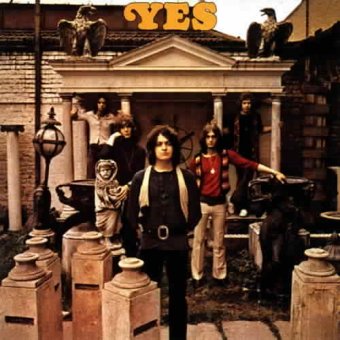
Yes (1969)

1. Beyond and Before
2. I See You
3. Yesterday and Today
4. Looking Around
5. Harold Land
6. Every Little Thing
7. Sweetness
8. Survival
Love ‘em or hate ‘em, Yes could probably claim to be the poster child of what is now known as “Prog Rock”. Those that hate them (and other acts of their type) state that rock and roll is supposed to be simple – without complex arrangements and volatile time signature changes. The band Yes, however, had very different ideas. To their credit, they mostly succeeded. A bit of a challenge when you consider that they probably win the blue ribbon in terms of personnel changes throughout their career. The band was always fine with the multitude of lineups – it sort of became a brand identity. “Let’s see what we can create in the studio with this lineup…..”.
The five key members of this freshmen effort had various degrees of experience with other efforts, but the musicianship was well polished. These guys definitely knew what they were doing within their craft. Chris Squire (the only member to survive to be a part of every Yes album) had a distinguished, fuzzy sounding bass guitar that always sounded like he wanted to stretch out and do more than merely be part of some boring rhythm section, and his strong playing is felt here, along with every other Yes album. Drummer Bill Bruford could arguably be considered the best Yes musician ever (but we really don’t want to start that argument), and at many times on this record, he sounds like he’s in a separate room doing a separate thing. It’s not that his drumming doesn’t sound like it doesn’t belong, it’s just that he sounds like he’s on fire, trying to fit in every fill that can be allowed. It’s a shame that most late 60s albums always had the drummer buried in the mix sounding like they were playing in a cardboard box lined with shag carpet.
Singer Jon Anderson had the sweet, silky, lovey-dovey tenor croon that really defined this groups sound more than any other of the multitude of instrumentalists. Any time we got one of those rare Yes albums that did not feature Anderson, it always seemed like something was sadly missing – no matter how much the new guy may have sounded like him. Keyboardist Tony Kaye also leaves a strong stamp. He was never as flamboyant as some of the many other keyboardists, but for many, this was a blessing rather than a curse.
Then we come to Peter Banks. You might say “Who??”, and that would be a shame. Banks would be the first causality of this band – probably because on their follow up record, Time and a Word, much of the guitar parts seemed to be swapped out by orchestral arrangements. It’s a mighty shame because his playing sounds magnificent here, and the career of Yes probably never would have faltered had they continued using him.
So with all of these great musicians, they put out a very good freshman effort. The music is a bit all over the place. Lots of instrumentation and lots of progressive sounding tunes. Of course, being that this was 1969, Progressive Rock hadn’t evolved yet to where artists would put out double albums, with each side containing one 20-minute song per side (more on that in a later review). And this really wasn’t anything that new for the times either. Groups such as Yes were popping up all over the place, but they managed to stay around longer than most. Their biggest success on their earliest records (for me anyway) was when they took other people’s music and played around with the arrangement making it somewhat more complex, yet just as appealing. Witness their cover of The Byrds I See You and The Beatles Every Little Thing. Sadly, this was something they basically stopped doing after a couple of albums. Perhaps it was just a way to get noticed? You know, put out a new album with “recognizable” songs to generate some interest? Regardless, the formula worked quite well.
Other highlights include the ballad (or slow song) Yesterday and Today, the choppy Survival, and the somewhat more delicate Sweetness. Truthfully, a lot of what is here sort of blends with everything else, but I would guess most serious musicians had a hoot with this one once they discovered it years later. I should have mentioned that on The Byrds song, Bill Bruford and Peter Banks play a killer duet in the middle of the track that really shows off their skills.
Not to be confused with their third album which was called The Yes Album.
Go to the Next Review
Go back to the main page